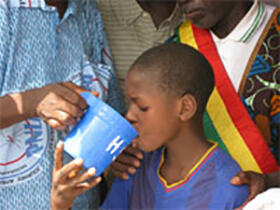
Liverpool Associates in Tropical Health (LATH) is a partner in the consortium that has been awarded £25 million funding from the UK Government to continue its fight against neglected tropical diseases. Led by the Schistosomiasis Control Initiative (SCI) at Imperial College London with the Centre for Neglected Tropical Diseases (CNTD) at Liverpool School of Tropical Medicine (LSTM), the award will provide 75 million treatments to protect some of the world’s poorest children against schistosomiasis – an illness caused by parasitic worms – and soil-transmitted helminths (STH). £15 million of the funding will be spent directly on procuring drug treatments, through Crown Agents.
More than 200 million people are infected with schistosomiasis worldwide, and many more are at risk due to poor hygiene and lack of safe water. In children, it can cause anaemia, stunted growth, and impaired learning ability. If left untreated, the symptoms escalate in adulthood and can result in liver disease and bladder cancer. An estimated 280,000 deaths every year in developing countries are attributable to schistosomiasis.
For the last 20 years, the drug praziquantel has been used to control schistosomiasis in countries around the world. Praziquantel greatly reduces the risk of severe disease, but despite its low cost, it is estimated that less than 10 per cent of people requiring treatment are currently being reached.
This award, from the UK Department for International Development, will provide £25 million over the next five years. The money will pay for praziquantel treatment to be delivered to children, high risk individuals and pregnant women in at least eight countries in sub-Saharan Africa. The aim is to eliminate the serious consequences of schistosomiasis from Niger and Uganda within five years; to expand treatment programme towards national coverage in Tanzania and Zambia, and begin programmes in four new countries. Existing CNTD support for lymphatic filariasis – another worm disease – in six countries will becoming integrated with schistosomiasis and STH treatment.
“For less than 50p per child per year we can deliver treatments that will put a stop to these diseases, which affect most developing countries,” said Professor Alan Fenwick OBE, Director of the SCI in the Department of Infectious Disease Epidemiology at Imperial College London. “This represents excellent value for public investment in health.”
In line with the government‘s push to make aid deliver better results, the consortium will safeguard the distribution of drugs and make sure they reach those most in need by providing aid only once agreed milestones have been met. Staff will be trained in the recipient countries to work within high risk communities.
The US government recently committed additional funding to neglected tropical diseases. The SCI, CNTD and USAID supported programmes will help integrate treatment across the targeted countries. The consortium will work with the World Health Organisation (WHO) to help recipient countries prepare national plans for the sustainable control of all neglected diseases, and with ministries of health or national partners to train staff to distribute drugs in communities that need them the most.